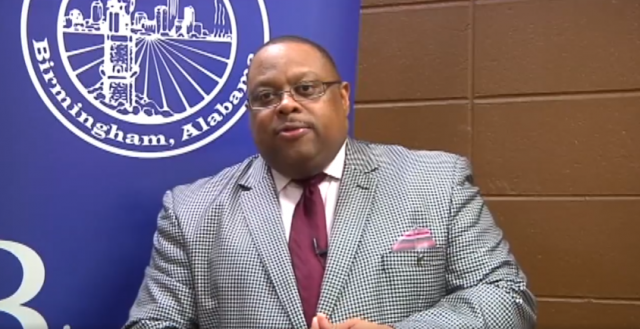
By Haley Wilson
The Birmingham Times
The celebration of Dr. Martin Luther King Jr.’s birthday in Birmingham and across the nation on Monday, January 17 was a proud moment for many including members of his fraternity, Alpha Phi Alpha Fraternity, Inc., the first and oldest collegiate fraternity for African American men.
King became a member of the Sigma chapter while he was a doctoral student at Boston University in Boston, Massachusetts in 1952. Other prominent Alphas include Frederick Douglass, anti-slavery activist; Thurgood Marshall, Civil Rights activist, Supreme Court Justice; W.E.B. Dubois, writer, historian, Civil Rights activist and Paul Robeson, activist, scholar, singer, and football player.
“To me, Dr. King’s legacy is one of resilience and extreme selflessness,” said Birmingham Mayor Randall Woodfin who joined the Alpha Rho chapter of Alpha Phi Alpha at Morehouse College spring of 2002. “Dr. King literally gave himself, his whole self, to the cause of equality. We often forget that the reverend was not as revered then as he is today. He faced criticism from almost every angle, yet he was true to his vision of a fair and equitable society.”
The fraternity was founded in 1906 at Cornell University in Ithaca, New York. It initially served as a study and support group for minority students who faced “racial prejudice, both educationally and socially.”
Operating under the guiding principles of “scholarship, fellowship, good character, and the uplifting of humanity”, the fraternity recognizes Thurgood Marshall, W. E. B. Du Bois, and King among its notable members.
Early Beginnings
King entered Morehouse College at the age 14, leading to the completion of his undergraduate degree in sociology in 1948. In 1951, he earned his divinity degree from Crozer Theological Seminary in Chester, Pennsylvania.
When he moved to Montgomery, Alabama in 1953, he joined the Alpha Upsilon Chapter of Alpha Phi Alpha.
“When he relocated that’s when he really started to make a name for himself within the fraternity,” said District Director of the Alabama district of Alpha Phi Alpha, Clinton L. Johnson. Johnson joined the Kappa Alpha chapter of Alpha Phi Alpha at The University of Alabama spring of 2004. “He married Coretta and became the pastor of Dexter Avenue Church, which was also the highlight of his work because that church was the birthplace of a lot of his famous speeches and sermons.”
In 1955, King received his doctorate from Boston University and also became the president of the Montgomery Improvement Association after Rosa Parks was arrested for refusing to give up her seat on a segregated bus, sparking the Montgomery Bus Boycotts.
“At this time, he had a lot of support fraternally,” Johnson said. “He was networking with different chapters all across the South. Brothers believed in the work he was doing within the civil rights movement. They all had the same goal of unity and were determined to make that happen along with him.”
During the Montgomery bus boycott trial in 1956, Alpha Phi Alpha’s national president, Frank L. Stanley Jr., stayed with King at the courthouse during his trial and presented him King with a check for $1,000 dollars.
In a letter to Dr. King, Stanley wrote “Alpha is proud of the leadership that you have given to the bus segregation protest movement in your city. We realize the trying hours you are experiencing as the object of a white council-controlled police department, and bomb wielding segregationists… But by the grace of God, you have been spared to continue the fight.
“Twenty-four thousand Alphas and millions of other Negroes fight with you, even though removed from the immediate scene of your battlefront. You have but to call on us, your Brothers, if we can be of any material assistance. We are already with you spiritually. At least, I personally and officially want to keep in close touch with you in this period of peril.”
At Alpha Phi Alpha’s 50th Anniversary celebration in 1956, King was honored with the fraternity’s highest honor: the Alpha Award of Merit, for appreciation of the “tireless efforts on behalf of African Americans.”
“As I look over the audience I see so many familiar faces and so many dear friends that it is a real pleasure to be here,” King began in his address. “I only regret that certain responsibilities elsewhere made it impossible for me to be in on the other part of the sessions…I am very happy to share the platform with so many distinguished Alpha men and so many distinguished American citizens and I say once more that this is a high moment in my life.”
“The award and its description speak for itself, said Woodfin, “However, the significance of the designation to me is in Dr. King’s age at the time. He was only 27 years old when he received the award. This is significant to me because, for some reason, we as a community have stopped lifting and trusting the vision and leadership of our greatest asset, its youngest generations.”
Throughout the early 1960s, King dedicated himself to the civil rights struggle. He famously wrote his Letter from a Birmingham Jail, in April of 1963 after being arrested for ignoring an Alabama state court injunction against demonstrations. The letter detailed a defense of nonviolent resistance to racism.
“Injustice anywhere is a threat to justice everywhere,” King said in the 21-page essay. “We are caught in an inescapable network of mutuality, tied in a single garment of destiny. Whatever affects one directly, affects all indirectly.”
MLK In Memory
In 1983, President Ronald Reagan signed into law the King Holiday which made King’s birthday a federal holiday. Shortly thereafter, a grass-roots campaign began to honor the Civil Rights icon with a memorial on the National Mall.
Alpha Phi Alpha members donated $3 million to the project. Those funds joined with schoolchildren’s donations of coins, contributions from individuals, large checks from 100 corporate sponsors, and $10 million in funds from the federal government.
“The memorial project was a really big deal for us,” said Birmingham Municipal Court Judge Andra D. Sparks, who joined the Gamma Phi chapter of Alpha Phi Alpha at Tuskegee University in the fall of 1982. “We used to have to take up money a lot during that time to see the project through. We wanted to see it happen.”
A ceremony dedicating the memorial was scheduled for Sunday, August 28, 2011, the 48th anniversary of the “I Have a Dream” speech that Martin Luther King Jr. delivered from the steps of the Lincoln Memorial in 1963, but was postponed until October 16 (the 16th anniversary of the 1995 Million Man March on the National Mall) due to Hurricane Irene.
The Fraternity’s private dedication on August 26, 2011, took place as planned with more than 5,000 Alpha Phi Alphas and their families and friends in attendance.
“For me, it’s almost emotional for me to go to DC and stand by that statue. It was a fulfillment of a lot of years of a lot of brothers and people, not just alphas, but people working hard to make sure that his work was memorialized,” said Sparks.
“I was so proud to have that picture of me standing by Dr. King’s monument and I feel I contributed to it from the very beginning. The amount of money I gave was nothing, but I participated in it from the very beginning from the foundation. We had so many people involved, but it was a nationally Alpha led project, and we’re thankful to everybody involved… all the multimillionaires who helped with it including Bill Clinton. It’s really a sight to see,” he said.




